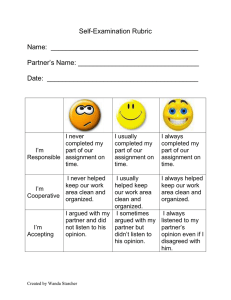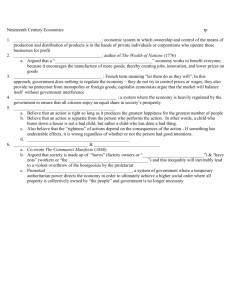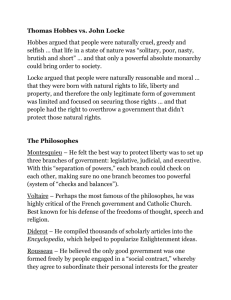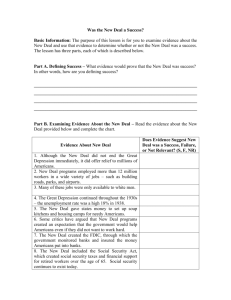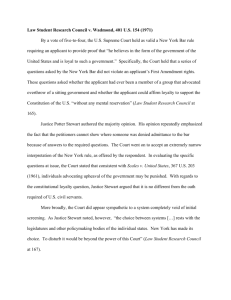President Pierce called the meeting to order at 4:03 p.m.... members of the faculty were present. University of Puget Sound
advertisement
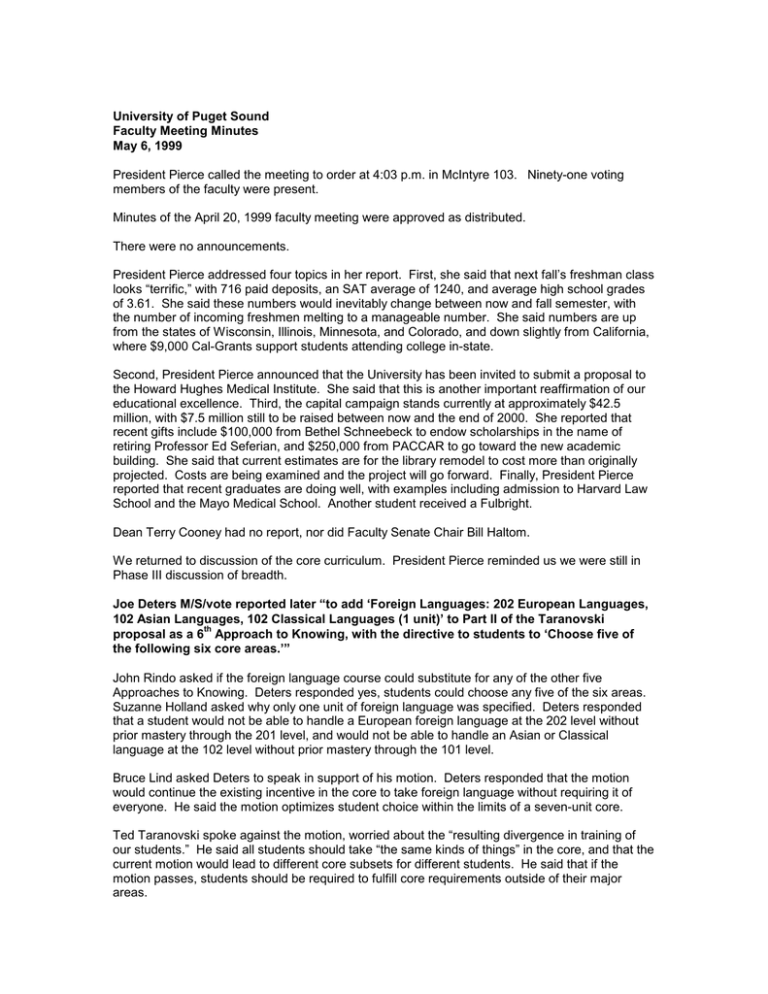
University of Puget Sound Faculty Meeting Minutes May 6, 1999 President Pierce called the meeting to order at 4:03 p.m. in McIntyre 103. Ninety-one voting members of the faculty were present. Minutes of the April 20, 1999 faculty meeting were approved as distributed. There were no announcements. President Pierce addressed four topics in her report. First, she said that next fall’s freshman class looks “terrific,” with 716 paid deposits, an SAT average of 1240, and average high school grades of 3.61. She said these numbers would inevitably change between now and fall semester, with the number of incoming freshmen melting to a manageable number. She said numbers are up from the states of Wisconsin, Illinois, Minnesota, and Colorado, and down slightly from California, where $9,000 Cal-Grants support students attending college in-state. Second, President Pierce announced that the University has been invited to submit a proposal to the Howard Hughes Medical Institute. She said that this is another important reaffirmation of our educational excellence. Third, the capital campaign stands currently at approximately $42.5 million, with $7.5 million still to be raised between now and the end of 2000. She reported that recent gifts include $100,000 from Bethel Schneebeck to endow scholarships in the name of retiring Professor Ed Seferian, and $250,000 from PACCAR to go toward the new academic building. She said that current estimates are for the library remodel to cost more than originally projected. Costs are being examined and the project will go forward. Finally, President Pierce reported that recent graduates are doing well, with examples including admission to Harvard Law School and the Mayo Medical School. Another student received a Fulbright. Dean Terry Cooney had no report, nor did Faculty Senate Chair Bill Haltom. We returned to discussion of the core curriculum. President Pierce reminded us we were still in Phase III discussion of breadth. Joe Deters M/S/vote reported later “to add ‘Foreign Languages: 202 European Languages, 102 Asian Languages, 102 Classical Languages (1 unit)’ to Part II of the Taranovski th proposal as a 6 Approach to Knowing, with the directive to students to ‘Choose five of the following six core areas.’” John Rindo asked if the foreign language course could substitute for any of the other five Approaches to Knowing. Deters responded yes, students could choose any five of the six areas. Suzanne Holland asked why only one unit of foreign language was specified. Deters responded that a student would not be able to handle a European foreign language at the 202 level without prior mastery through the 201 level, and would not be able to handle an Asian or Classical language at the 102 level without prior mastery through the 101 level. Bruce Lind asked Deters to speak in support of his motion. Deters responded that the motion would continue the existing incentive in the core to take foreign language without requiring it of everyone. He said the motion optimizes student choice within the limits of a seven-unit core. Ted Taranovski spoke against the motion, worried about the “resulting divergence in training of our students.” He said all students should take “the same kinds of things” in the core, and that the current motion would lead to different core subsets for different students. He said that if the motion passes, students should be required to fulfill core requirements outside of their major areas. University of Puget Sound Faculty Meeting Minutes May 6, 1999, Page 2 Harry Velez-Quinones spoke in favor of the motion. He argued that, just as major requirements offer students choice, so should the core, because different students are different learners. Deters followed up by adding that the value of the core is in its totality, not in any individual course. Lind argued that it is misleading to call this a one-unit requirement, because of the prerequisites for foreign language at the 102 or 202 levels. Mike Veseth responded that the motion is a compromise that allows foreign language into the core. He spoke in favor of the motion by saying it is more honest than the current core because foreign language is made explicit. He then said that working against the motion is the fact that foreign language does not have much in common with the other five broad areas. He said that once students start taking individual courses within each of the broad areas, the various sets of courses students would take would be very different, suggesting as Taranovski argued, that students should fulfill core requirements outside their major areas. Kent Hooper argued that students attending the University of Puget Sound should have sufficient foreign language preparation in high school to begin foreign language study at the 202 level. Bill Breitenbach, arguing that if the various Approaches to Knowing are important, they should be required of all students, M/S/vote reported later “to amend the motion to add ‘Foreign Languages: 202 European Languages, 102 Asian Languages, 102 Classical Languages (1 unit)’ as a sixth separate Approach to Knowing, with students directed to take all six.” Steve Neshyba asked if the 102 or 202 foreign language courses fulfilling the requirement would be “special” Approaches to Knowing courses or existing courses. Deters responded that they would be the existing courses that already go beyond “grammar and skills.” Wade Williams asked if the foreign language department could provide this level of foreign language instruction for all students, but there was not an immediate response to his question. Ron Van Enkevort said he didn’t think we could ask students to take four units of foreign language to meet a requirement through the 202 level. He said “that’s too many.” President Pierce asked Dean Cooney if we knew how much foreign language our incoming freshmen bring with them. Cooney, turning to Kris Bartanen, said he thought we did know that, and Bartanen relayed George Mills’ report that, among 1996-entering freshmen, 6 arrived with six years of foreign language, 47 with five years, 187 with four years, 271 with three years, 210 with two years, and 19 with zero or one year. Sandler asked if it would be possible for students with high levels of foreign language proficiency to test out of the requirement. Deters responded that he thought students should have to take one unit of foreign language at whatever level they can handle, with no testing out of the requirement allowed. Bartanen asked whether students who were ready to enter Spanish 230, for example, would still have to take Spanish 202. Without answering that question, Velez asked whether students highly proficient in mathematics are exempted from the mathematical reasoning requirement. Knowing they are not, Velez argued that foreign language is a discipline, not a skill, and that all students, regardless of proficiency, can find an appropriate place in the discipline. Keith Ward expressed some confusion about whether we were talking about foreign language proficiency or something else. He said that requiring all courses through the 202 level implies proficiency, but that if foreign language is a discipline why could we not simply require one unit of foreign language at any level or perhaps one foreign language-oriented course in one of the Approaches to Knowing categories. University of Puget Sound Faculty Meeting Minutes May 6, 1999, Page 3 Larry Stern asked whether the Breitenbach amendment was a friendly amendment as far as the foreign language department was concerned. This inquiry was met with nervous laughter. Velez speculated on the impact of a foreign language requirement of one year at various levels, 101/102 or 201/202, for example. Breitenbach said that was not what he intended with the amendment. Michael Curley asked if a student could “go straight to 202” if he or she was ready for that, and the foreign language faculty said yes. President Pierce suggested that perhaps we need to do some modeling, to determine what the pattern of foreign language offerings might look like based on the levels of foreign language preparation of current incoming students. She suggested that such modeling might also address the questions that had been raised about staffing patterns. David Droge argued that the earlier faculty decision to try to shape a seven-unit core “raises the bar” for anything added beyond the seventh unit. He said that in that context he could support the foreign language proposal only if (1) it is shown to be essential to liberal arts education, or (2) the “shape and structure of what we’ve already done” calls for another requirement to complete the core. Taranovski spoke against the amendment, arguing that it is “cultural imperialism” to favor the current list of European, Asian, and Classical languages, when they are but a small number of the 2,500 languages being spoken in the world. He said some students are very proficient in languages that are excluded from the current list. Haltom said we should stop asking the foreign language department what they meant by the original motion because “the motion belongs to all faculty at this point.” Haltom said he favored a seven-unit core and that we should not move up to eight or nine or ten as the current motion would require. He urged us to vote “no.” Bob Matthews argued that foreign language study is an essential part of liberal education, because it puts students in touch with foreign culture and their own language “as nothing else does.” He asked why an unprepared foreign language student would be required to take four semesters of a European language and only two semesters of an Asian or Classical language. Deters responded that most students come from high school with some European language background, so that the number of semesters required to reach the target 202 or 102 levels would be about the same in the European and the Asian/Classical groups. Michel Rocchi argued against the amendment because of its impact on the foreign language department. He said it is not what the department wants. He said the original motion is more “palatable” to the non-language student. Rocchi M/S/P to close debate. The motion to close debate passed on a voice vote. Before voting on the amendment, the assembly agreed to accept as a friendly amendment the words “or above” so that wording became “Foreign Languages: 202 or above European Languages, 102 or above Asian Languages, 102 or above Classical Languages (1 unit).” The motion to amend failed on a paper ballot, with 17 in favor and 73 opposed. Rindo M/S/F to close debate on the original motion. The motion to close debate failed on a hand vote for lack of a two-thirds majority, with 42 in favor and 40 opposed. Then followed a seesaw of arguments against and in favor of the motion. Arguing against the motion was Andy Rex, who opposed the erosion it would bring in the math/science areas. He said a student would be able to graduate with only one course in math or science, down from four University of Puget Sound Faculty Meeting Minutes May 6, 1999, Page 4 currently. He said that was not acceptable. Arguing in favor of the motion was Williams, who said it helps move us toward a multicultural world. Suzanne Barnett argued against the motion, saying that “requiring five of six devalues everything on the list.” She said there were other ways to deal with foreign language. Keith Maxwell also argued against the motion, saying it dilutes the core and requires prerequisites the other areas don’t have. Peter Wimberger said that by keeping the core small we allow students more flexibility. He said requiring foreign language is logistically difficult. Nancy Bristow argued in favor of the motion, citing the value foreign language has for students, from her own experience taking Spanish last fall. Duane Hulbert argued against the motion, saying none of the five existing areas is expendable. He suggested we might be able to include one or more of them in the freshman seminars. Lisa Wood argued against the motion, but said she favors including a foreign language requirement of some kind. She said an eight-unit core was okay with her. Carolyn Weisz said she too was not constrained by seven units, and that foreign language needs to be there somewhere, perhaps in an upper-division requirement. Velez spoke in favor, concerned that if the current motion fails, we may not get another chance to include foreign language in the core. Matthews argued that foreign language is not less essential than the other five areas. He said the current motion was a good compromise. Dean Cooney said he disagreed that this was our last chance to include foreign language. He said we should not include foreign language in the manner of the current motion simply as a means of staying within a seven-unit core. Someone M/S/P to close debate. The motion to close debate passed on a voice vote. The original Deters motion then failed on a paper ballot, with 24 in favor and 59 opposed. We adjourned at 5:20 p.m. Respectfully submitted, John M. Finney Secretary of the Faculty
